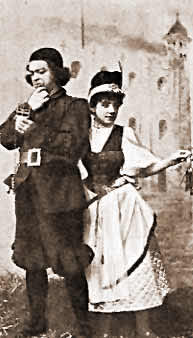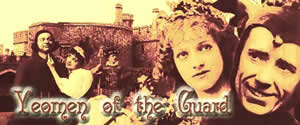You are here: > > > Act I
Wilfred. (looking after Elsie) 'Tis an odd freak for a dying man and his confessor to be closeted alone with a strange singing girl. I would fain have espied them, but they stopped up the keyhole. My keyhole!
Enter Phœbe with Sergeant Meryll. Meryll remains in the background, unobserved by Wilfred.
Phœbe. (aside) Wilfred — and alone!
Wilfred. Now what could he have wanted with her? That's what puzzles me!
Phœbe. (aside) Now to get the keys from him. (aloud) Wilfred — has no reprieve arrived?
Wilfred. None. Thine adored Fairfax is to die.
Phœbe. Nay, thou knowest that I have naught but pity for the poor condemned gentleman.
Wilfred. I know that he who is about to die is more to thee than I, who am alive and well.
Phœbe. Why, that were out of reason, dear Wilfred. Do they not say that a live ass is better than a dead lion? No, I don't mean that!
Wilfred. Oh, they say that, do they?
Phœbe. It's unpardonably rude of them, but I believe they put it in that way. Not that it applies to thee, who art clever beyond all telling!
Wilfred. Oh yes, as an assistant-tormentor.
Phœbe. Nay, as a wit, as a humorist, as a most philosophic commentator on the vanity of human resolution.
Phœbe slyly takes bunch of keys from Wilfred's waistband and hands them to Meryll, who enters the Tower, unnoticed by Wilfred.

Wilfred. Truly, I have seen great resolution give way under my persuasive methods. (working a small thumbscrew) In the nice regulation of a thumbscrew — in the hundredth part of a single revolution lieth all the difference between stony reticence and a torrent of impulsive unbosoming that the pen can scarcely follow. Ha! ha! I am a mad wag.
Phœbe. (with a grimace) Thou art a most light-hearted and delightful companion, Master Wilfred. Thine anecdotes of the torture-chamber are the prettiest hearing.
Wilfred. I'm a pleasant fellow an I choose. I believe I am the merriest dog that barks. Ah, we might be passing happy together —
Phœbe. Perhaps. I do not know.
Wilfred. For thou wouldst make a most tender and loving wife.
Phœbe. Aye, to one whom I really loved. For there is a wealth of love within this little heart — saving up for — I wonder whom? Now, of all the world of men, I wonder whom? To think that he whom I am to wed is now alive and somewhere! Perhaps far away, perhaps close at hand! And I know him not! It seemeth that I am wasting time in not knowing him.
Wilfred. Now say that it is I — nay! suppose it for the nonce. Say that we are wed — suppose it only — say that thou art my very bride, and I thy cheery, joyous, bright, frolicsome husband — and that, the day's work being done, and the prisoners stored away for the night, thou and I are alone together — with a long, long evening before us!
Phœbe. (with a grimace) It is a pretty picture— but I scarcely know. It cometh so unexpectedly — and yet — and yet — were I thy bride —
Wilfred. Aye! — wert thou my bride —?
Phœbe. Oh, how I would love thee!
|
Page Created 13 January, 2006






